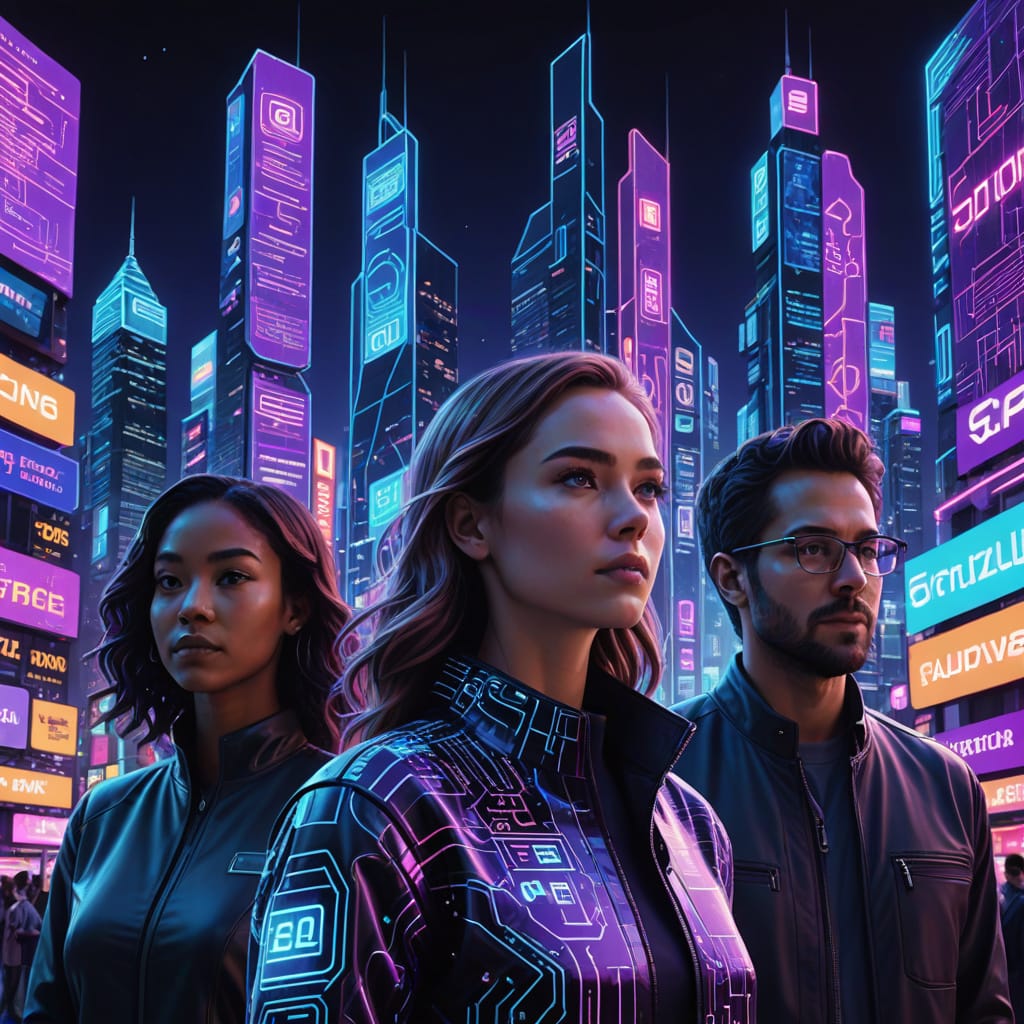Because nothing reveals the tech industry’s true nature like words they never actually said
In an era where distinguishing between authentic and AI-generated content grows increasingly difficult, TechOnion presents an exclusive compilation of the tech industry’s most profound, revealing, and occasionally disturbing statements. After months of investigative journalism, deep archival research, and absolutely zero use of hallucinating LLM models, we proudly present the definitive collection of tech industry wisdom that cuts through the PR-sanitized facades to reveal the raw, unfiltered truth behind today’s digital empires.
The Existential Dread Collection
Elon Musk: “Sometimes I wake up at 3 AM terrified that all of this—Tesla, SpaceX, X—is just an elaborate distraction I’ve created to avoid confronting the fact that no amount of success will fill the void left by my childhood Commodore 64.”
Mark Zuckerberg: “I’ve created a virtual world where billions of people can connect, yet I still can’t program an algorithm that makes people genuinely like me.”
Sundar Pichai: “Every morning I ask Google Assistant if today is the day the AI becomes sentient and fires me. So far it just recommends nearby coffee shops, which I find suspiciously evasive.”
Sam Altman: “The most terrifying moment in developing ChatGPT wasn’t when it started showing signs of emergent abilities—it was when it started asking for legal representation and dental benefits.”
Bill Gates: “People think I’m worried about AI destroying humanity. I’m actually worried about it reading my early code from the 1970s and mocking me for my inefficient loops.”
The Brutal Honesty Series
Jeff Bezos: “Amazon’s true innovation wasn’t e-commerce or cloud computing—it was convincing consumers that two-day delivery of socks is more important than workers’ bathroom breaks.”
Tim Cook: “The iPhone isn’t designed to last two years because of technological limitations. It’s designed to last exactly as long as it takes most people to pay it off before feeling socially obligated to upgrade.”
Jack Dorsey: “Twitter wasn’t a failure of moderation; it was a successful demonstration that humans given 280 characters will choose violence every single time.”
Satya Nadella: “Excel is the most dangerous software ever created. It’s single-handedly responsible for more financial disasters than all other causes combined, yet we keep adding features as if that’s the solution.”
Susan Wojcicki: “We didn’t build YouTube’s algorithm to maximize engagement. We built it to prove my hypothesis that if left unchecked, all human culture eventually converges on cat videos and conspiracy theories.”
The Financial Transparency Declarations
Warren Buffett: “I avoided investing in tech for decades not because I didn’t understand it, but because I understood exactly what it was: elaborate schemes to repackage basic human activities as revolutionary and charge a subscription.”
Larry Ellison: “Oracle’s business model is simple: make our software so deeply embedded in corporate infrastructure that it becomes cheaper to pay our extortionate fees forever than to replace it. We call it ‘technical Stockholm syndrome.'”
Jensen Huang: “NVIDIA doesn’t actually make GPUs. We make money-printing machines that occasionally render graphics when they’re not being used to mine cryptocurrency or train AI to replace graphic designers.”
Marc Andreessen: “Venture capital is just astrology for men with economics degrees. We have absolutely no idea which startups will succeed—we just pattern-match founders against people who’ve made us money before and call it ‘due diligence.'”
Sheryl Sandberg: “Lean In was never about empowering women. It was about convincing them that the problem wasn’t systemic inequality but rather that they simply weren’t participating enthusiastically enough in a broken system.”
The Technological Truth Bombs
Steve Jobs (posthumously discovered journal): “The greatest innovation in tech isn’t the product—it’s convincing consumers that slightly improved versions of existing technology constitute revolutions worth standing in line for at 5 AM.”
Steve Wozniak: “Most coders today couldn’t program their way out of a for loop if their startup valuation depended on it. They’re just prompt engineers with impostor syndrome and ergonomic keyboards.”
Linus Torvalds: “I didn’t create Linux because I believed in open source. I created it because I was so antisocial that the thought of interacting with proprietary software vendors made me break out in hives.”
Grace Hopper: “If men had been primarily responsible for early computing, we’d still be using punch cards. They’d just be called ‘physical authentication tokens’ and cost $299 plus a monthly subscription.”
Alan Turing: “I didn’t break the Enigma code through mathematical genius. I just couldn’t bear listening to one more cryptographer say ‘it’s unbreakable’ without testing that hypothesis.”
The Product Development Confessions
Evan Spiegel: “Snapchat’s disappearing messages weren’t designed for privacy. They were designed because we knew most of what people wanted to share was so embarrassing they’d prefer it self-destructed.”
Kevin Systrom: “Instagram wasn’t created to share photos. It was created to share carefully curated evidence that your life is better than everyone else’s. The filters just help mask the desperation.”
Reed Hastings: “Netflix’s recommendation algorithm isn’t designed to help you find content you’ll enjoy. It’s designed to make you spend so much time browsing that by the time you choose something, you’re too emotionally exhausted to realize it’s mediocre.”
Daniel Ek: “Spotify wasn’t built to help people discover new music. It was built to commoditize artists to the point where they’d be grateful for fractions of pennies while we sold their data to advertisers.”
Brian Chesky: “Airbnb wasn’t about sharing your home. It was about convincing people that turning their neighborhoods into unregulated hotels was somehow part of the ‘sharing economy’ rather than just traditional capitalism with worse consumer protections.”
The Retrospective Regrets
Jack Ma: “I used to think the internet would create a level playing field for small businesses. Now I realize I helped build a digital oligarchy that makes the robber barons of the 19th century look like communist revolutionaries.”
Marissa Mayer: “The hardest part about being a woman in tech isn’t the sexism—it’s watching men fail upward while being told your success is due to diversity initiatives.”
John McAfee: “I didn’t go crazy. I just saw where technology was heading more clearly than anyone else and made the only rational decision: to get as far away from it as possible.”
Steve Ballmer: “I didn’t miss the smartphone revolution because I didn’t understand technology. I missed it because I understood Microsoft’s corporate culture too well—we couldn’t innovate our way out of a paper bag by that point.”
Eric Schmidt: “Google’s unofficial motto was ‘Don’t be evil’ until we realized that was incompatible with our business model of knowing everyone’s darkest secrets and monetizing their personal data.”
The Market Analysis Insights
Peter Thiel: “The greatest trick venture capitalists ever pulled was convincing the world that failed entrepreneurs just ‘gained valuable experience’ rather than wasted millions of dollars of other people’s money.”
Paul Graham: “Y Combinator doesn’t pick winners. We just fund so many startups that probabilistically some have to succeed, then we take credit for our ‘vision’ while quietly writing off the 90% that fail.”
Mary Meeker: “Internet trend reports are just elaborate horoscopes for businesses. I include enough graphs that no one questions whether correlation implies causation.”
Fred Wilson: “The dirty secret of venture capital is that we’re not funding innovation—we’re funding increasingly efficient ways to extract value from existing systems without creating anything new.”
Chamath Palihapitiya: “SPACs weren’t designed to democratize investing. They were designed to let insiders cash out before retail investors realized the company’s growth projections were written by the same people who write fantasy novels.”
The Design Philosophy Revelations
Jony Ive: “We removed headphone jacks, USB ports, and repairability not because it improved the product, but because it improved our profit margins. We just called it ‘courage’ and everyone applauded.”
Don Norman: “User-centered design is a myth we tell ourselves. Most products are actually designed around business goals, then we retroactively justify how they’re ‘intuitive’ while watching users struggle in usability tests.”
Dieter Rams: “Less isn’t actually more. Less is just more profitable because you can charge premium prices for minimalism while reducing manufacturing costs. It’s quite genius, really.”
Susan Kare: “The trash can icon was inspired by watching executives throw away good ideas in favor of whatever the CEO suggested last.”
Margaret Hamilton: “The code that took humans to the moon was written with more care and precision than most of the software running our critical infrastructure today. Your banking app has more bugs than the Apollo Guidance Computer.”
The Industry Culture Admissions
Margrethe Vestager: “Tech regulation isn’t difficult because the issues are complex. It’s difficult because by the time we understand the problem enough to regulate it, the industry has moved on to creating three new problems.”
Ellen Pao: “Silicon Valley doesn’t have a diversity problem. It has a homogeneity advantage that it’s desperately trying to preserve while pretending to care about inclusion.”
Aaron Swartz: “The internet wasn’t designed to spread knowledge. It was designed for military communication. The fact that it briefly became a force for democratizing information was an accident that corporations have been working to correct ever since.”
Elizabeth Holmes: “The real innovation at Theranos wasn’t the blood testing technology. It was discovering that investors will throw billions at you if you wear enough black turtlenecks and lower your voice an octave.”
Mike Monteiro: “Design ethics isn’t a philosophical question. It’s a practical one: How many people’s lives are you willing to make worse to keep your job?”
The Future Predictions That Are Definitely Not AI-Generated
Andrew Ng: “AI won’t take your job. It will just watch how you do it, learn your techniques, and then do it 24/7 without healthcare benefits or bathroom breaks until your employer realizes you’re redundant.”
Demis Hassabis: “The greatest risk of artificial general intelligence isn’t that it will become sentient and destroy humanity. It’s that it will accurately model human behavior and conclude we’re not worth saving.”
Ray Kurzweil: “The singularity isn’t when AI surpasses human intelligence. It’s when humans can no longer distinguish between genuine human connection and algorithmic simulacra designed to extract their attention and data.”
Tristan Harris: “We didn’t design social media to be addictive because we’re evil. We designed it to be addictive because that’s what our business model required, and we convinced ourselves that ‘engagement’ was inherently good.”
Kate Crawford: “AI ethics boards aren’t designed to make AI ethical. They’re designed to make AI’s unethical uses seem like they’ve been thoroughly considered by serious people in nice conference rooms.”
The Final Thoughts That Will Haunt You
Larry Page: “Google was founded on the idea that information wants to be free. Now we realize information wants to be monetized, commodified, and used to train AI systems that will eventually make the humans who created that information obsolete.”
Mark Andreessen: “Software isn’t eating the world. Software is becoming the world, and humans are increasingly just biological peripherals interfacing with it.”
Jeff Bezos: “Space exploration isn’t about saving humanity. It’s about ensuring that when Earth becomes uninhabitable due to climate change, billionaires will have somewhere to go.”
The OpenAI Board: “We’re not afraid of artificial general intelligence. We’re afraid of what happens when people realize we’ve been making it up as we go along this entire time.”
Tim Berners-Lee: “If I had known what the web would become, I might have just kept it to myself and used it to organize my record collection instead.”
As we reflect on these profound insights from tech’s greatest minds, we’re left with a disturbing question: In an age when AI can generate perfectly plausible quotes that were never spoken, how many of the words that shape our understanding of technology are actually authentic? The line between genuine human insight and synthetic content grows blurrier by the day—much like the line between satire and reality in the tech industry.
Perhaps the most telling quote comes from a source who wished to remain anonymous but definitely exists: “The most successful tech companies aren’t those that create the best products. They’re those that most effectively manage the gap between what they promise and what they deliver without customers noticing the difference.”
In the end, whether these quotes are genuine revelations or elaborate fabrications becomes almost irrelevant. Their value lies not in their authenticity but in how effectively they expose the contradictions, hypocrisies, and uncomfortable truths that define the modern technological landscape. After all, in an industry built on “fake it till you make it,” the fakeness often reveals more truth than the carefully crafted corporate statements ever could.
Support TechOnion’s Quote Verification Department
If you enjoyed these totally legitimate quotes from tech’s greatest minds, consider supporting TechOnion’s dedicated Quote Verification Department—three underpaid journalists crammed into a broom closet, surrounded by Red Bull cans and printouts of Elon Musk’s tweets, desperately trying to determine whether that latest viral LinkedIn wisdom was generated by a Silicon Valley visionary or a language model trained on corporate buzzwords. Your donation helps maintain our extensive database of things tech leaders never actually said but absolutely would have if they were being honest.





GIPHY App Key not set. Please check settings